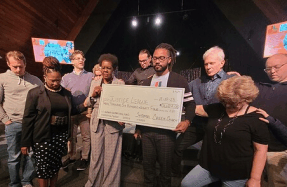For Some Hard-To-Find Tumors, Doctors See Promise In Artificial Intelligence

Artificial intelligence, which is bringing us everything from self-driving cars to personalized ads on the web, is also invading the world of medicine.
In radiology, this technology is increasingly helping doctors in their jobs. A computer program that assists doctors in diagnosing strokes garnered approval from the U.S. Food and Drug Administration earlier this year. Another that helps doctors diagnose broken wrists in x-ray images won FDA approval on May 24th.
One particularly intriguing line of research seeks to train computers to diagnose one of the deadliest of all malignancies, pancreatic cancer, when the disease is still readily treatable.
That's the vision of , a professor of radiology at Johns Hopkins Medicine in Baltimore.
You’re reading a preview, subscribe to read more.
Start your free 30 days



